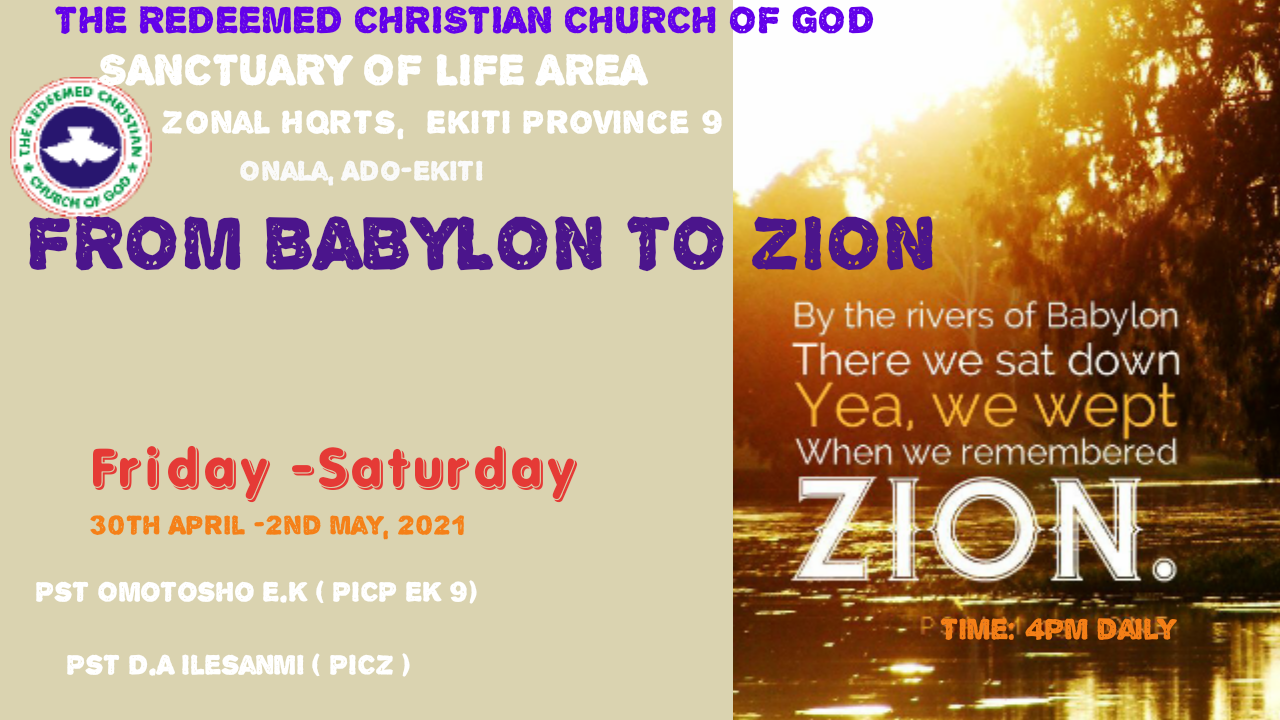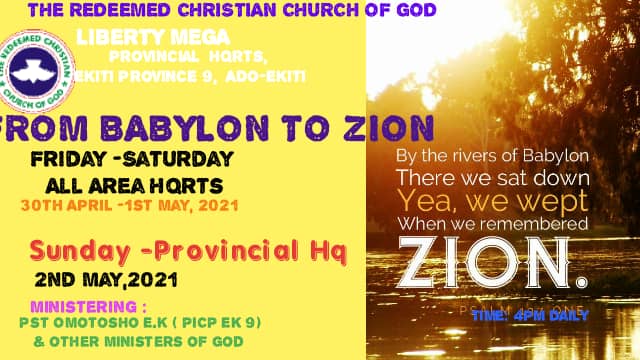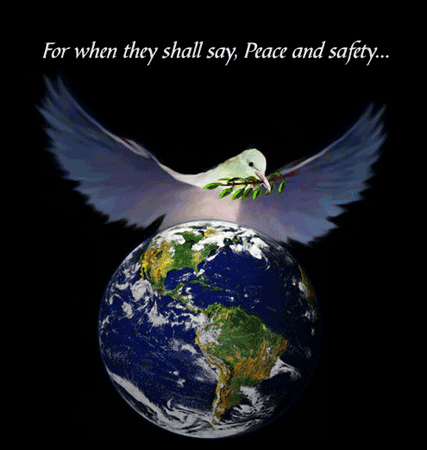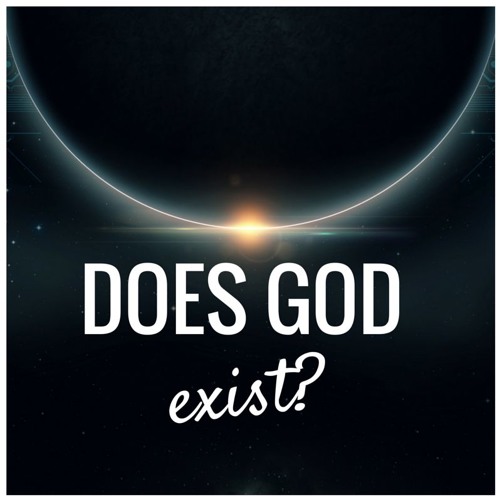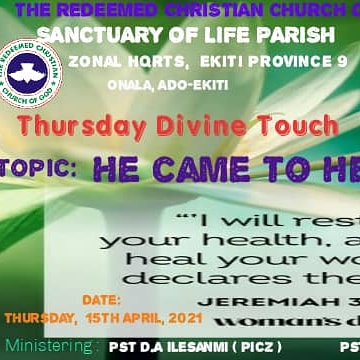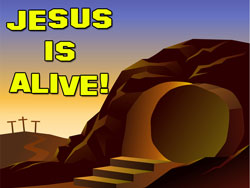CREATING ZION IN THE MIDST OF BABYLON : AN EXEGETICAL STUDY OF PSALMS 137:1
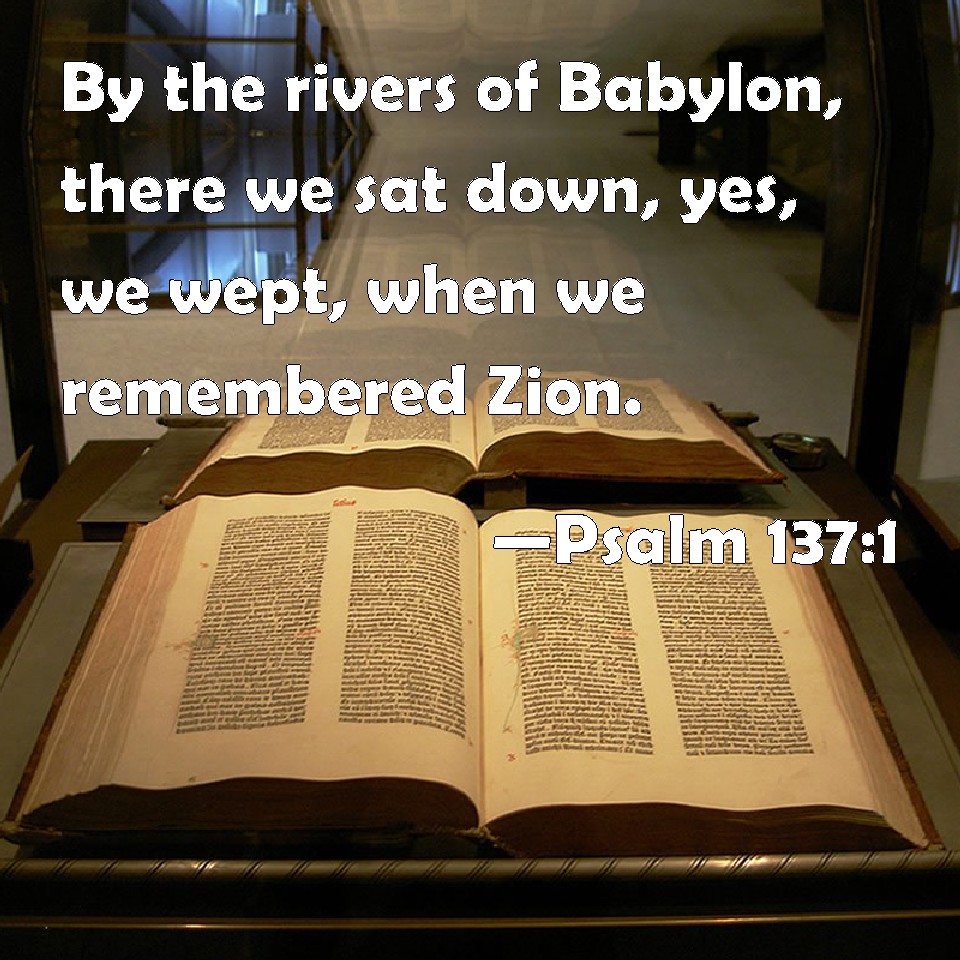
CREATING ZION IN THE MIDST OF BABYLON : AN EXEGETICAL STUDY OF PSALMS 137:1
By
Pastor Dele Ilesanmi (Bamigbade ), PhD
INTRODUCTION
Language can be denotatively or connotatively used. The choice of a speaker or writer in the use of a word is predicated on his/her circumstances or happenings around him/her at the time of speaking or writing the word. The diction can only be understood by those who understand the dynamics of language. The names of two great cities mentioned together in a sentence in the Bible: “Babylon” and “Zion” in Psalms 137:1 indicate two great opposing nations in character and religion, in social life and belief systems. “Babylon” represents everything evil. It is man’s city; it figures falsehood; and represents the kingdom of darkness. The other city, “Zion”, is a representation of everything good. It is God’s city; it figures truth; and represents the Kingdom of Light. These two cities exist in principles today: Babylon is the city of the world; Zion is the city of God. This paper is therefore set to unravel the nuances between the two great cities in relation to what each represents in the present circumstances of our lives, and their emerging trends in the contemporary world. The paper also beams search light on the possibility of creating haven of peace, safety, holiness, and better life, which Zion represents in the midst of a vast forest of violence, carnality, sensuality, decadence, corruption, and evil, which Babylon represents.
THE SYMBOLISM AND CONCEPTUALISATION OF BABYLON AND JERUSALEM (OR ZION)
Panoramic view
Babylon is a city-state in Southern Mesopotamia during Old Testament times. This city became a large empire that absorbed the nation of Judah and destroyed Jerusalem. Babylon was the principal and capital city of the Babylonian empire.
Babylon was known as the center of iniquity, carnality, worldliness, and religious plurality. Everything connected with it was in opposition to all righteousness and had negative effect on humanity. The principal building in the city of Babylon was a temple to a false god, which we often refer to as Bel or Baal. But eventually, Babylon was also destroyed by Xerxes in 478 B.C.
Babylon symbolizes evil and God is set to destroy it:
“19 And Babylon, the glory of kingdoms, the beauty of the Chaldees’ excellency, shall be as when God overthrew Sodom and Gomorrah.20 It shall never be inhabited, neither shall it be dwelt in from generation to generation: neither shall the Arabian pitch tent there; neither shall the shepherds make their fold there. 21 But wild beasts of the desert shall lie there; and their houses shall be full of doleful creatures; and owls shall dwell there, and satyrs shall dance there. 22 And the wild beasts of the islands shall cry in their desolate houses, and dragons in their pleasant palaces: and her time is near to come, and her days shall not be prolonged.” (Isa 13:19-22)
“37And Babylon shall become heaps, a dwellingplace for dragons, an astonishment, and an hissing, without an inhabitant… “52 Wherefore, behold, the days come, saith the LORD, that I will do judgment upon her graven images: and through all her land the wounded shall groan. 53 Though Babylon should mount up to heaven, and though she should fortify the height of her strength, yet from me shall spoilers come unto her, saith the LORD. 54 A sound of a cry cometh from Babylon, and great destruction from the land of the Chaldeans: 55 Because the LORD hath spoiled Babylon, and destroyed out of her the great voice; when her waves do roar like great waters, a noise of their voice is uttered: 56 Because the spoiler is come upon her, even upon Babylon, and her mighty men are taken, every one of their bows is broken: for the LORD God of recompences shall surely requite. 57 And I will make drunk her princes, and her wise men, her captains, and her rulers, and her mighty men: and they shall sleep a perpetual sleep, and not wake, saith the King, whose name is the LORD of hosts. 58 Thus saith the LORD of hosts; The broad walls of Babylon shall be utterly broken, and her high gates shall be burned with fire; and the people shall labour in vain, and the folk in the fire, and they shall be weary.” (Jer. 51: 37; 52-58)
Babylon symbolizes harlotry and abomination:
“ And upon her forehead was a name written, MYSTERY, BABYLON THE GREAT, THE MOTHER OF HARLOTS AND ABOMINATIONS OF THE EARTH.” (Rev.17:5)
The cesspit of devils, foul spirit, and uncleanliness:
“ And he cried mightily with a strong voice, saying, Babylon the great is fallen, is fallen, and is become the habitation of devils, and the hold of every foul spirit, and a cage of every unclean and hateful bird.” (Rev.18:2)
Prophetic utterance for the fall of spiritual Babylon
“And, behold, here cometh a chariot of men, with a couple of horsemen. And he answered and said, Babylon is fallen, is fallen; and all the graven images of her gods he hath broken unto the ground” (Isa.21:9)
“And a mighty angel took up a stone like a great millstone, and cast it into the sea, saying, Thus with violence shall that great city Babylon be thrown down, and shall be found no more at all.” (Rev.18:21)
Christians (the saints of God) are commanded to flee out of the midst of Babylon:
“Flee out of the midst of Babylon, and deliver every man his soul: be not cut off in her iniquity; for this is the time of the LORD’s vengeance; he will render unto her recompense.” (Jer. 51:6)
The Lord will not spare anyone that remains in spiritual Babylon
God’s judgment will come upon the spiritual Babylon:
“Standing afar off for the fear of her torment, saying, Alas, alas, that great city Babylon, that mighty city! for in one hour is thy judgment come “ (Rev.18:10)
The righteous will rejoice over the fall of spiritual Babylon .
“Rejoice over her, thou heaven, and ye holy apostles and prophets; for God hath avenged you on her.” (Rev.18:20)
“1 And after these things I heard a great voice of much people in heaven, saying, Alleluia; Salvation, and glory, and honour, and power, unto the Lord our God: 2 For true and righteous are his judgments: for he hath judged the great whore, which did corrupt the earth with her fornication, and hath avenged the blood of his servants at her hand. 3 And again they said, Alleluia. And her smoke rose up for ever and ever.” (Rev.19:1-3)
On the other hands, Zion is the name given by the Lord to His righteous Saints. The name has different connotations. The name “Zion” was first mentioned in the account of David’s conquest of Jerusalem (2Sam.5:6-10; 1Chron.11:49). Jerusalem was the name of the city-state as a whole, which “included numerous villages and houses located outside of the fortified area of the city itself.” The name “Zion” was used by biblical writers in a variety of ways. “It has sometimes been used, as by the prophet Micah, to refer to the location of ‘the mountain of the house of the Lord’—as some place apart from Jerusalem. (Micah 4:2).
According the Holman Illustrated Bible Dictionary, “many of the psalmists used the term to refer to the temple built by Solomon (2:6; 48:2; 84:7; 132:13)”. Also in the Book of Isaiah, the idea of “Zion” included the whole nation (Isa.1:27). In Amos 6:1, “Zion” stood for the capital of Judah. But the most common usage of the name “Zion” was to refer to the city of God in the new age (Isa.1:27; 28:16;33:5). Zion was also understood as the heavenly Jerusalem (Isa.60:14; Heb.12:22; Rev.14:1). It is also believed that “the place where the Messiah would appear at the end of time. The glorification of the messianic community will take place on the holy mountain of “Zion”.
Zion is the pure in heart in any day, in any time, in any place.The people of Zion are of one heart and one mind; they dwell in righteousness, and there are no poor among them.
Zion symbolises a place of holiness and beauty:
“Out of Zion, the perfection of beauty, God hath shined.” (Ps.50:2)
“And the LORD will create upon every dwelling place of mount Zion, and upon her assemblies, a cloud and smoke by day, and the shining of a flaming fire by night: for upon all the glory shall be a defence.” (Isaiah 4:5).
The Lord is the founder and sustainer of Zion:
“What shall one then answer the messengers of the nation? That the LORD hath founded Zion, and the poor of his people shall trust in it.”(Isa.14:32)
The righteous represents “Zion” – the city of the Lord
“The sons also of them that afflicted thee shall come bending unto thee; and all they that despised thee shall bow themselves down at the soles of thy feet; and they shall call thee, The city of the LORD, The Zion of the Holy One of Israel.” (Isa.60:14)
CONTEXTUAL EXEGESIS
“By the rivers of Babylon, there we sat down, yea, we wept, when we remembered Zion.”(Psalms 137:1).
This text reveals two cities that differ in socio-political and economic life; religious, spiritual and moral leaning. One is receptive to spiritual and moral rectitude while the other is hostile to it. One is a centre of love. kindness and holiness. The other city is a cesspool of hatred, carnality, molestation, rapes, kidnapping, and killings. The ownership of these two cities are different: one is controlled by God and the other by Satan. One represents the Kingdom of Light and the other the kingdom of darkness. In his work titled “Millennial Messiah”, McConkie describes the city of Babylon as:
“In prophetic imagery, Babylon is the world with all its carnality and wickedness. Babylon is the degenerate social order created by lustful men who love darkness rather than light because their deeds are evil. Babylon is the almighty governmental power that takes the saints of God into captivity; it is the false churches that build false temples and worship false gods; it is every false philosophy … that leads men away from God and salvation. Babylon is false and degenerate religion in all its forms and branches. Babylon is the communistic system that seeks to destroy the freedom of people in all nations and kingdoms; it is the Mafia and crime syndicates that murder and rob and steal; it is the secret combinations that seek for power and unrighteous dominion over the souls of men. Babylon is the promoter of pornography; it is organized crime and prostitution; it is every evil and wicked and
ungodly thing in our whole social structure” (McConkie, Millennial Messiah, 424).
.
“Alas! the nations are in a deep sleep! They are drunken with the abominations of great Babylon! Their cup of wickedness is nearly full! It will soon overflow! Then shall the day of their visitation come—a day of sorrow and mourning—a day of great distress—a day of peril and war! The hosts of the mighty shall fall! The strength of the nations shall cease, and their glory shall pass away! … Then shall the remnant of the heathen know that the Lord is God, for they shall see and hear of his judgments, which he shall execute upon the corrupt powers of the earth. … O Babylon! thou hast decked thyself with costly ornaments! Thou hast clothed thyself with the most gaudy apparel! … Thine external appearance has excited the admiration of all nations. But internally thou art rotten. … Thou hast gathered the tares of the earth, and bound them in bundles, and made their bands strong, that they may be ready for the burning. O Babylon, thy cup is nearly full! Thine hour is close at hand! Thou shalt fall and not rise again!” (Orson Pratt, Masterful Discourses and Writings of Orson Pratt, 86–87).
“Here is a truism that all men should hear: Babylon fell, and her gods with her; and Babylon shall fall, and her gods with her. False gods create an evil society. The world is the world, and Babylon is Babylon, because they worship false gods. When men worship the true God according to gospel standards, their social conditions rival those in Enoch’s city; when men worship false gods, they fall into the ways of the world, and their social conditions become as those in Babylon. When we view the fall of Babylon anciently, what we see is the destruction of her idols and ways of worship; and we shall come to the fall of Babylon in the last days, it will be—oh blessed day—the destruction of false worship. … The great and abominable church shall tumble to the dust. False worship shall cease” (McConkie, Millennial Messiah, 429–30).
Again, Zion is periscoped thus:
“We are here to build up the church of God, the Zion of God, and the kingdom of God, and to be on hand to do whatever God requires—first to purge ourselves from all iniquity, from covetousness and evil of every kind, to forsake sin of every sort, cultivate the Spirit of God, and help to build up his kingdom; to beautify Zion and have pleasant habitations, and pleasant gardens and orchards, until Zion shall be the most beautiful place there is on the earth. … Zion shall yet become the praise and the glory of the whole earth” (Taylor, Gospel Kingdom, 221).
“The people of the city of Enoch, because of their integrity and faithfulness, were as pilgrims and strangers on the earth. This is due to the fact that they were living the celestial law in a telestial world, and all were of one mind, perfectly obedient to all commandments of the Lord. When Christ comes, these people will be returned to the earth again, for this is their eternal abode” (Joseph Fielding Smith, Church History and Modern Revelation, 1:195).
As spiritual Babylon ripens in iniquity, a great latter-day Zion will be established.
“In the day of regeneration, when all things are made new, there will be three great cities that will be holy. One will be the Jerusalem of old which shall be rebuilt according to the prophecy of Ezekiel. One will be the city of Zion, or of Enoch, which was taken from the earth when Enoch was translated and which will be restored; and the city Zion, or New Jerusalem, which is to be built by the seed of Joseph on this the American continent” (Joseph Fielding Smith, Answers to Gospel Questions, 2:105).
“[The Lord] has told us in great plainness that the world will be in distress, that there will be warfare from one end of the world to the other, that the wicked shall slay the wicked and that peace shall be taken from the earth. And He has said, too, that the only place where there will be safety will be in Zion. Will we make this Zion? Will we keep it to be Zion, because Zion means the pure in heart?” (George Albert Smith, in Conference Report, Oct. 1941, 99).
“Jesus will never receive the Zion of God unless its people are united according to celestial law, for all who go into the presence of God have to go there by this law. Enoch had to practice this law, and we shall have to do the same if we are ever accepted of God as he was. It has been promised that the New Jerusalem will be built up in our day and generation, and it will have to be done by the United Order of Zion and according to celestial law” (Wilford Woodruff, in Journal of Discourses, 17:250).
“When Zion descends from above, Zion will also ascend from beneath, and be prepared to associate with those from above. The people will be so perfected and purified, ennobled, exalted, and dignified in their feelings and so truly humble and most worthy, virtuous and intelligent that they will be fit, when caught up, to associate with that Zion that shall come down from God out of heaven” (John Taylor, in Journal of Discourses, 10:147).
“We live in a day when the whole social structure is dividing itself into two camps. This is a day of the polarization of all people. In the Church the faithful members are perfecting their lives and drawing nearer to the Lord and his way of life. In the world wickedness is increasing and the rebellious and carnal among men are sinking to lower levels of evil and depravity than has been the case in any past days. These trends will continue unabated until the Lord comes. When he arrives there will be, on the one hand, a people prepared to meet him, and, on the other hand, there will be greater wickedness and carnality than has ever before been known. As time goes on, fewer and fewer among men will remain aloof from one or the other of these camps.
“Then when the Lord comes, he himself will both cause and complete the division among the people. Then there will be a great day of separation in which the wicked will be consumed and the righteous will be rewarded. …
“… The Lord does not delight in the destruction of the wicked. His bounteous mercy and grace and goodness are available for all men in all ages, but they are poured out only upon those whose works merit the receipt of such a wondrous boon. ‘For behold, the righteous shall not perish; for the time surely must come that all they who fight against Zion shall be cut off.’” (McConkie, Millennial Messiah, 554–55, 560).
There are many nations, especially in Africa that typify Babylon. The contemporary Babylon is an epicentre of sensuality, corruption, and decadence, terrorism, molestation, kidnapping, killing, and the worshipping of false gods which are seen in many cities, great and small, scattered across the globe. Babylon represents anything evil. In Rom.10:3, the Bible says, “For they being ignorant of God’s righteousness, and going about to establish their own righteousness, have not submitted themselves unto the righteousness of God.”
In the text under examination, we could discover that the author (though unknown) recalled the good old days before the conquest of Jerusalem by Babylon: “By the rivers of Babylon, there we sat down, yea, we wept, when we remembered Zion.”(Psalms 137:1). The people wept because they remembered when they were in Zion with full access to their God; access to social and infrastructural amenities; they wept because they remembered the time when they could eat their preferred food and chose the type of wears they liked from their wardrobes. They remembered that Zion was free from violence, corruption, decadence of any type, and evil as were experiencing in Babylon. Nigerians who were born 50 years ago could recall that Nigeria was a “Zion”. The socio-economic life of the people was better than the present time. Our Naira was stronger than Dollar. The standard of living was quite amazing. In 1980s, a tin of Peak milk was less than #20. Then I could buy milk for my dogs. I could recall that there was a time I sold a big cock, very big at the rate of #80. As at that time of Zion’s experience, Nigeria was already tilting towards Babylonian Captivity. I could walk more than six miles alone to the farm to join my father as a pupil after returning from school on Fridays and returned home on Sundays before dawn without any fear of attack of molestation. But, today, the story is different. So, as Nigerians, when we remember our Zion’s experience, with nostalgia, we are likely to weep if we truly experience Zion. Any country that has experienced the good old days and now strongly to go back to that time is already in her Babylon, trying to return to Zion. if you were rich before, had sound health before, and serving God before but the story has changed today, you are already in your Babylon – Babylonian captivity. Think of going back to your Zion.
CREATING ZION IN THE MIDST OF BABYLON
Given the features of Babylon above, one could conclude that Babylonian experience is not good. As Christians, it is highly imperative for us to create our own Zion in the midst of our present Babylon. As Nigerian Christians, we can still be holy in the midst of prevalent corruption. We can still hold on to our God regardless of the present threats from the power that be and other religions.
“Zion in the midst of Babylon.” What a luminous and incandescent phrase, as a light shining in the midst of spiritual darkness. What a concept to hold close to our hearts, as we see Babylon becoming more widespread. We see Babylon in our cities; we see Babylon in our communities; we see Babylon everywhere.
“And with the encroachment of Babylon, we have to create Zion in the midst of it. We should not allow ourselves to be engulfed by the culture which surrounds us. We seldom realize the extent to which we are a product of the culture of our place and time.
“During the days of ancient Israel, the people of the Lord were an island of the one true God, surrounded by an ocean of idolatry. The waves of that ocean crashed incessantly upon the shores of Israel. Despite the commandment to make no graven image and bow down before it, Israel seemingly could not help itself, influenced by the culture of the place and time. Over and over again—despite the prohibition of the Lord, despite what prophet and priest had said—Israel went seeking after strange gods and bowed down before them.
“How could Israel have forgotten the Lord, who brought them out of Egypt? They were constantly pressured by what was popular in the ambience in which they lived.
“What an insidious thing is this culture amidst which we live. It permeates our environment, and we think we are being reasonable and logical when, all too often, we have been molded by the ethos, what the Germans call the zeitgeist, or the culture of our place and time.
“There is, of course, a zeitgeist to which we should pay attention, and that is the ethos of the Lord, the culture of the people of God. As Peter states it, “But ye are a chosen generation, a royal priesthood, an holy nation, a peculiar people; that ye should shew forth the praises of him who hath called you out of darkness into his marvellous light” (1 Pet. 2:9)…
“There may be a lesson here for us. We can create the real Zion among us by limiting the extent to which Babylon will influence our lives.
“When, about 600 years B.C., Nebuchadnezzar came from Babylon and conquered Judah, he carried away the people of the Lord. Nebuchadnezzar selected some of the young men for special education and training.
“Among them were Daniel, Hananiah, Mishael, and Azariah. They were to be the favored ones among the young people brought to Babylon. The king’s servant instructed them that they were to eat of the king’s meat and drink of the king’s wine.
“Let us clearly understand the pressures that the four young men were under. They had been carried away as captives by a conquering power and were in the household of a king who held the power of life or death over them. And yet Daniel and his brothers refused to do that which they believed to be wrong, however much the Babylonian culture believed it to be right. And for that fidelity and courage, the Lord blessed them and “gave them knowledge and skill in all learning and wisdom” (Dan. 1:17).
“Seduced by our culture, we often hardly recognize our idolatry, as our strings are pulled by that which is popular in the Babylonian world. Indeed, as the poet Wordsworth said: “The world is too much with us” (“The World Is Too Much with Us; Late and Soon,” in The Complete Poetical Works of William Wordsworth [1924], 353). In his first epistle, John writes:
“I have written unto you … because ye are strong, and the word of God abideth in you, and ye have overcome the wicked one.
“Love not the world, neither the things that are in the world” (1 Jn. 2:14–15).
We do not need to adopt the standards, the mores, and the morals of Babylon. We can create Zion in the midst of Babylon. We can have our own standards for music and literature and dance and film and language. We can have our own standards for dress and deportment, for politeness and respect. We can live in accordance with the Lord’s moral laws. We can limit how much of Babylon we allow into our homes by the media of communication.
“Wherever we are, whatever city we may live in, we can build our own Zion by the principles of the celestial kingdom and ever seek to become the pure in heart. Zion is the beautiful, and the Lord holds it in His own hands. Our homes can be places which are a refuge and protection, as Zion is.
“We do not need to become as puppets in the hands of the culture of the place and time. We can be courageous and can walk in the Lord’s paths and follow His footsteps. And if we do, we will be called Zion, and we will be the people of the Lord.
“I pray that we will be strengthened to resist the onslaught of Babylon and that we can create Zion in our homes and our communities—indeed, that we may have “Zion in the midst of Babylon.”3
CONCLUSION
As Christians, we need to be optimistic that one day we will return to Zion. Our future is very bright. We need to remind ourselves that Enoch and his people created Zion in their day, and the four Hebrew men: Daniel, Hananiah, Mishael, and Azariah created Zion during the time of great wickedness and evil in the land of Babylon. We can do the same. Our Babylon will soon fall, and our Zion will soon be established, and we shall all shout for joy at the second coming of our Lord Jesus Christ. Amen.
END NOTES
Beautifully explained in “Holman Illustrated Bible Dictionary”, 2003
https://www.churchofjesuschrist.org/study/manual/doctrines-of-the-gospel-student-manual/35-fall-of-babylon-and-establishment-of-zion?lang=eng. Accessed on 28/04/21
https://www.churchofjesuschrist.org/study/general-conference/2006/04/zion-in-the-midst-of-babylon?lang=eng. Accessed on 28/04/21

